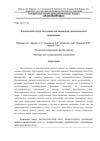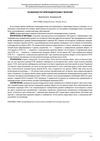1 citations,
April 1993 in “Problemy e̊ndokrinologii” Spironolactone effectively reduces symptoms of hyperandrogenism like hirsutism and acne.
[object Object]  December 2024 in “Problems of Biological Medical and Pharmaceutical Chemistry”
December 2024 in “Problems of Biological Medical and Pharmaceutical Chemistry” Students from the Middle East and Moscow have different hair element levels due to their environments.
 November 2024 in “Fizioterapevt (Physiotherapist)”
November 2024 in “Fizioterapevt (Physiotherapist)” Combined therapy is highly effective for treating diffuse alopecia.
 November 2024 in “Fizioterapevt (Physiotherapist)”
November 2024 in “Fizioterapevt (Physiotherapist)” High-intensity phototechnology, especially with other treatments, effectively improves quality of life for diffuse alopecia patients.
 October 2024 in “A I Burnasyan Federal Medical Biophysical Center Clinical Bulletin”
October 2024 in “A I Burnasyan Federal Medical Biophysical Center Clinical Bulletin” Various treatments effectively manage androgenetic alopecia.
 August 2024 in “Siberian Journal of Life Sciences and Agriculture”
August 2024 in “Siberian Journal of Life Sciences and Agriculture” Melatonin and lyotritone improve hair growth and quality in white rats.
July 2024 in “Vestnik dermatologii i venerologii” Post-COVID-19 hair loss is different from androgenetic alopecia and can be identified by lower copper and higher selenium levels.
 May 2024 in “Rossijskaâ oftalʹmologiâ onlajn”
May 2024 in “Rossijskaâ oftalʹmologiâ onlajn” Early treatment with corticosteroids improved her eye condition significantly.
 April 2024 in “Lečaŝij vrač”
April 2024 in “Lečaŝij vrač” Valproic acid can cause low platelet counts, especially at high doses or in elderly patients.
 April 2024 in “Vestnik dermatologii i venerologii”
April 2024 in “Vestnik dermatologii i venerologii” Exosomes show promise for diagnosing and treating skin conditions and hair loss.
 April 2024 in “Remedium Journal about the Russian market of medicines and medical equipment”
April 2024 in “Remedium Journal about the Russian market of medicines and medical equipment” Pharmacy workers need more education to better help people with hair loss.
 February 2024 in “Agroèkoinfo”
February 2024 in “Agroèkoinfo” Environmental factors and grain products affect hair loss, with low cobalt in hair possibly predicting the condition.
 January 2024 in “Vestnik oftalʹmologii”
January 2024 in “Vestnik oftalʹmologii” Stopping minoxidil and using prostaglandin analogues improved the man's eye condition.
 January 2024 in “Современные проблемы науки и образования (Modern Problems of Science and Education)”
January 2024 in “Современные проблемы науки и образования (Modern Problems of Science and Education)” Treating post-COVID hair loss leads to full recovery, while not treating it often results in ongoing symptoms.
 January 2024 in “Современные проблемы науки и образования (Modern Problems of Science and Education)”
January 2024 in “Современные проблемы науки и образования (Modern Problems of Science and Education)” Miliacin helps extend the hair growth phase in mice with hair loss.
[object Object] January 2024 in “Bulletin of Medical Science” Pantotherapy is more effective for treating androgenetic alopecia than darsonvalization.
 December 2023 in “Farmateka”
December 2023 in “Farmateka” Minoxidil is an effective and safe treatment for common hair loss when applied to the skin, but more research is needed for optimal use.
 December 2023 in “Bulletin of the Medical Institute of Continuing Education”
December 2023 in “Bulletin of the Medical Institute of Continuing Education” Angelica Dahurica extract helps reduce hair loss and improve hair growth and scalp condition.
 October 2023 in “Èkologiâ čeloveka”
October 2023 in “Èkologiâ čeloveka” People in Moldova have less selenium in their hair than recommended, which may contribute to hair loss.
 May 2023 in “Vestnik dermatologii i venerologii”
May 2023 in “Vestnik dermatologii i venerologii” Early-stage male pattern baldness shows two types of hair loss: one on the top of the head linked to hormonal changes, and another at the back of the head. The top hair loss responds well to specific treatment, while the back hair loss does not.
 February 2023 in “Sibirskij onkologičeskij žurnal”
February 2023 in “Sibirskij onkologičeskij žurnal” Chemotherapy often causes hair loss in cancer patients, affecting their mental health, but scalp cooling can help prevent it.
 January 2023 in “Медицинский вестник Северного Кавказа”
January 2023 in “Медицинский вестник Северного Кавказа” The patient with Hoffman's folliculitis got better with the right treatment, leading to hair regrowth.
 January 2023 in “Voprosy kurortologii fizioterapii i lechebnoĭ fizicheskoĭ kultury”
January 2023 in “Voprosy kurortologii fizioterapii i lechebnoĭ fizicheskoĭ kultury” COVID-19 may cause hair loss, often after recovery, with androgenetic alopecia being the most common type.
 January 2023 in “Sovremennye problemy nauki i obrazovaniâ”
January 2023 in “Sovremennye problemy nauki i obrazovaniâ” Miliacin may help prevent hair loss and improve hair growth in mice with a condition similar to human baldness.
 January 2023 in “Sibirskij medicinskij vestnik”
January 2023 in “Sibirskij medicinskij vestnik” Women with PCOS are more vulnerable to severe COVID-19 and related health issues.
 November 2021 in “Permskij medicinskij žurnal”
November 2021 in “Permskij medicinskij žurnal” Women with menstrual dysfunction often have deficiencies in magnesium, iron, and vitamin D.
 September 2021 in “Kazanskij medicinskij žurnal”
September 2021 in “Kazanskij medicinskij žurnal” Electrical and chemical skin stimulation can improve hair growth.
 September 2021 in “Conference Proceedings”
September 2021 in “Conference Proceedings” Older men with high total testosterone might not show symptoms, while younger men with hyperandrogenism may experience hair loss or acne.
January 2021 in “Voprosy ginekologii akušerstva i perinatologii” Effective management of hyperandrogenism in young women requires accurate diagnosis and tailored treatment.
 December 2020 in “Vestnik dermatologii i venerologii”
December 2020 in “Vestnik dermatologii i venerologii” Combining iron supplements with physiotherapy could better treat women's hair loss linked to iron deficiency.

























